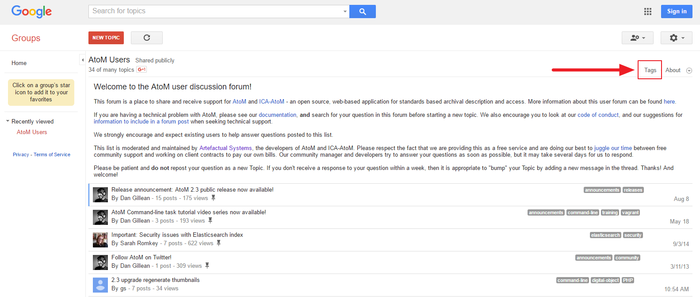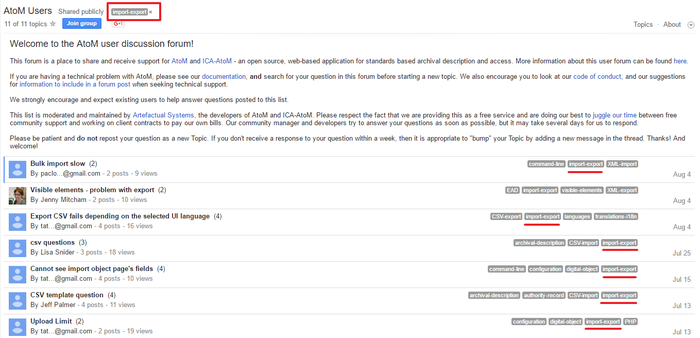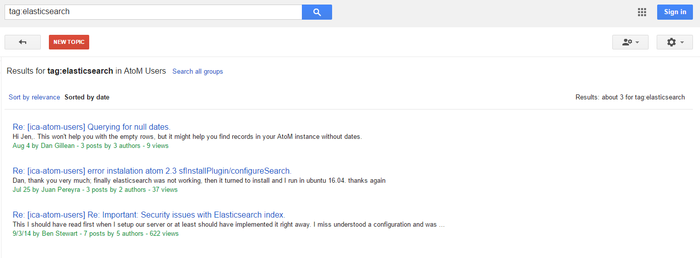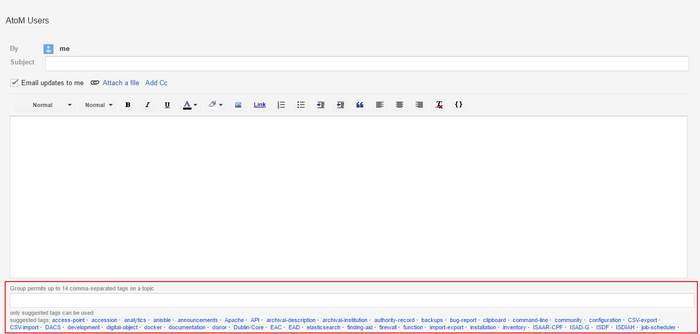User forum tags
Main Page > Resources > Resources/User forum > Tags
We have enabled topical tagging in the AtoM user forum to help with searching and browsing. If you wish, you can tag your post with keywords - the forum administrators may also add or remove tags later on as we see fit.
Instructions on searching and browsing forum posts with tags, as well as how to tag your own posts, are included below, along with a full list the the tags currently available for use in the forum.
Seealso
The AtoM User Forum is maintained via Google Groups - for more information, see the Groups Help pages.
Searching and browsing with tags
Browsing by tag
If you want to browse all the tags currently in use in the forum, you will find a full list via the link in the right-hand top corner of the AtoM Forum home page:
Clicking on the link will take you to a page where you can see a list of all available tags. To filter all posts to a specific tag, you can either click on a tag from the list, or you can begin typing the tag into the input box above the list, and selecting the matching tag from the autocomplete results that appear.
The AtoM user forum will reload, with your selected tag at the top of the page, and the results limited to those posts where the selected tag has been added.
Searching by tag
You can also use the search box on the AtoM Forum page to use a tag as part of a more complex search. entering the tag you wish to search for, preceded by tag: will return results for posts with that tag. For example if you wanted to see all posts that had both the import-export and the ead tag, you could search: tag:import-export tag:EAD.
Seealso
There are a lot of other useful search terms and operators you can use to improve your searching. For more information, see the following Groups help articles:
Adding a tag to your posts
At this time, there's no way to add a tag from your email - so if you're subscribed to the User Forum and using it as a mailing list, you'll have to visit the Forum on the web (here) if you want to add tags to your posts.
From the web home, there are 2 ways you can add tags - either while creating a new post, or after you've posted, starting a thread.
To add tags as you are composing your post, click the "new topic" button from the Forum home page - you will see an area at the bottom of the compose page where you can add tags:
If you want to add tags to your post after you've already posted it (for example, if you start a topic via email, and then navigate to the Forum on the web), open the thread, and at the top of the thread, you should see a link that says "Add tags."
Full tag list
Below is a list of all the tags currently in use the AtoM User Forum:
- 500-error
- 504-timeout
- access-point
- accessibility
- accession
- analytics
- announcements
- ansible
- Apache
- API
- archival-description
- archival-institution
- archivematica
- AtoM3
- audit-log
- authority-record
- backups
- bug-report
- camps
- clipboard
- command-line
- community
- configuration
- CSV-export
- CSV-import
- DACS
- data-corruption
- Debian
- dependencies
- description-updates
- development
- digital-object
- DIP_upload
- docker
- documentation
- donor
- Dublin-Core
- EAC
- EAD
- elasticsearch
- FAQ
- finding-aid
- firewall
- formatting
- Foundation
- FreeBSD
- function
- governance
- hosting
- import-export
- installation
- inventory
- ISAAR-CPF
- ISAD-G
- ISDF
- ISDIAH
- job-scheduler
- languages
- LDAP
- linked-data
- linux
- logging
- mac-OS
- menus
- migration
- MODS
- monitoring
- multi-repository
- new-feature
- Nginx
- OAI-PMH
- off-topic
- Oracle
- permissions
- PHP
- physical-storage
- plugins
- publication-status
- RAD
- regional-groups
- releases
- reports
- responsive-design
- rights
- scalability
- search-browse
- security
- SEO
- service-providers
- settings
- single-sign-on
- SKOS
- slugs
- SQL
- standards
- static-pages
- symfony
- system-requirements
- taxonomies
- themes
- training
- translations-i18n
- treeview
- upgrades
- usability
- user-stories
- users-groups
- vagrant
- visible-elements
- web-server
- Windows
- wish-list
- XML-export
- XML-import







